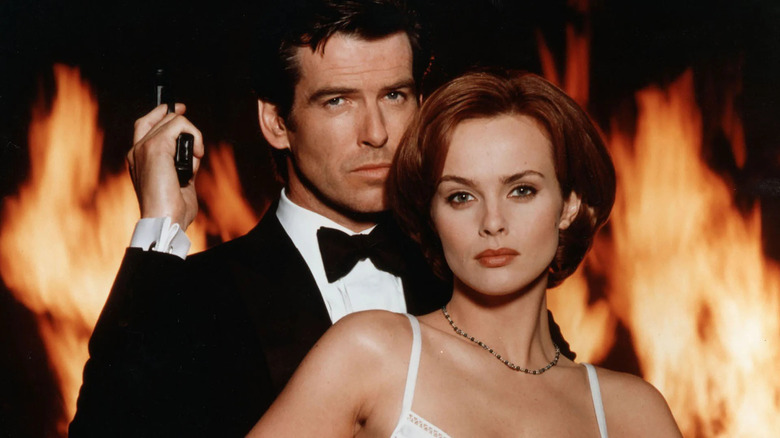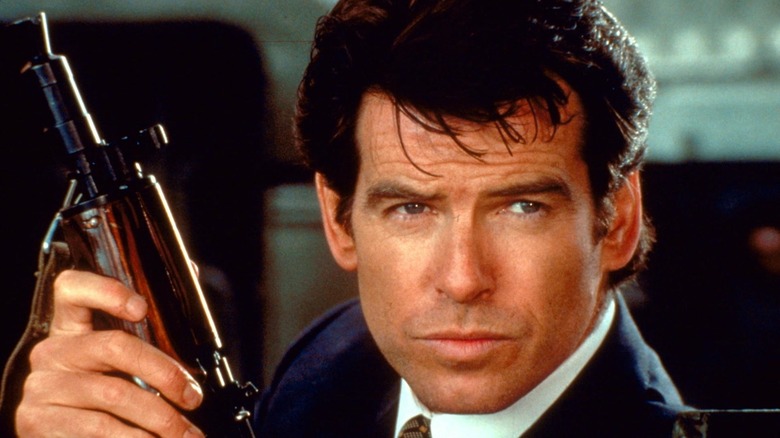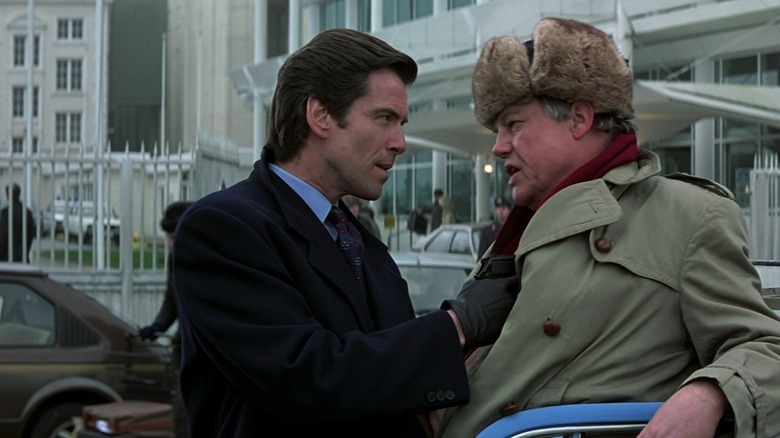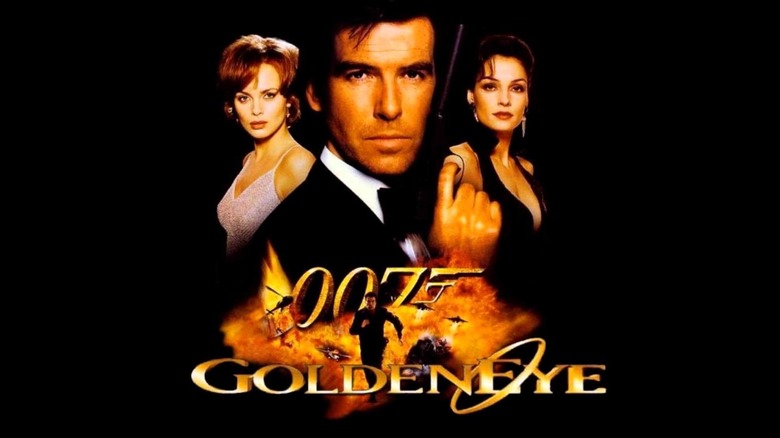GoldenEye Was Almost The End Of The James Bond Franchise
From the release of "Dr. No" in 1962, all the way through "Licence to Kill" in 1989, a new film in the James Bond series came around every other year or so. The British spy hero was a steady and constant reminder of a certain kind of masculine ideal (always capable in situations of violence, possessed of sophisticated taste in booze, access to fun gadgets and high-end hotels, the ability to seduce any number of slinky women), as well as a way to fictionally assert power over England's (as well as America's) enemies during the Cold War; the antagonists of James Bond movies were typically a shadowy cabal of "foreigners," deranged billionaires, or the USSR.
In November of 1989, however, the Berlin Wall fell, and in 1991, there was a coup in Russia, ending the existence of the Soviet Union and effectively ending the Cold War. It looked like James Bond's usefulness as a fictional construct was at an end; without a Cold War, there was no longer a need for a Cold War hero. Additionally, changing social mores became increasingly critical of James Bond's cavalier sexual attitudes, and the continuance of the character was brought into question.
The 1995 film "GoldenEye," directed by Martin Campbell (who would also direct the 2006 reboot "Casino Royale"), was a necessary balancing act. Working uphill, "GoldenEye" had to prove that James Bond still had a function in the post-Cold War world. Additionally, "GoldenEye" was to debut a new actor in the role, Pierce Brosnan, who — as with all actors who play the part — had big shoes to fill and big martinis to drink. There was little faith from the studios that "GoldenEye" would even work, and the studio only granted a relatively small $60 million budget.
In a 2015 oral history of "GoldenEye" Campbell remembers the press surrounding the production very well.
Not relevant to the 1990s
As Campbell put it:
"I remember that there was a lot of bad press, because there'd been such a long gap since Dalton's films. Plus, they had been considered a low in terms of the Bond franchise. Everyone was feeling that it might be over. There were things in the press about its being past its sell-by date, and finished, and a relic, and not relevant to the 1990s, and all that sort of s***."
Indeed, within the film itself, M (Judi Dench) refers to Bond as a dinosaur. But Campbell described Brosnan as a "terrific new Bond," which he did prove to be. Brosnan possessed the flip smirk of Moore, the steely capability of Dalton, and the confident masculinity of Connery. To this author's eye, he is the best Bond. Barbara Broccoli, the producer, also understood what was happening in the press:
"There was a lot of 'Does the world need James Bond?' The Berlin Wall had come down and the Soviet Union had broken up. Our feeling was that all that made the world even more dangerous! Good and evil became blurred. The main story of that film was "What is going to happen now?" Of course, things got pretty bad. So I think Pierce's Bond reflected the changing world order and the need, more so than ever, for heroic endeavor."
Or, as Pierce Brosnan himself stated succinctly, "You're always going to have bad guys."
True Lies
The largest amount of concern, however, came from the special effects team on "GoldenEye." The James Bond movies had long before come to be known for their enormous action set pieces, and each film, in order to pass muster, needed to provide a certain amount of visual pizazz and legitimate peril in order to register. Under the scrutiny of the press, and knowing that nothing could go half-cocked, the effects team knew what was at stake. "GoldenEye" effects coordinator Chris Corbould openly acknowledged that this could be the end of the line for James Bond. They needed to match the level of action seen in James Cameron's "True Lies" (1994) or go home:
"We all felt that this could be the end of the Bond franchise if we didn't get it right. During that lay-off there had been some extraordinary films. I thought the stuff they did in "True Lies" was mind-blowing, for example. Films like that really upped the ante for Bond. It was crucial to make this a fantastic Bond film, otherwise it was going to fade into oblivion."
Indeed, the specter of "True Lies" hung over the entire production staff. Campbell was aware of how impressive that film was and seems to have viewed it as the bar everyone was going to have to clear. Surpassing James Cameron on technicals is no small feat. Luckily for Campbell, Peter Lamont, the production designer for 18 Bond films, was just coming off of working on "True Lies":
"Martin Campbell asked me what my last film was. I said True Lies and he just went white. From then on it was never in question that I'd be production designer. It's funny, everyone always assumes that Jim Cameron and I talked at length about the Bond films, but the truth is we never mentioned them!"
Curse you, James Cameron!
With Cameron acting as a pace car, "GoldenEye" constructed numerous impressive action set pieces, including a slick break-in sequence at a dam, a skydiving scene wherein Bond jumped sans parachute to a falling glider, and a finale set on and around a giant satellite dish. Despite the film's relatively low budget, this was no time to skimp. Says Campbell:
"We had to have those sorts of films in mind. Jim Cameron, who's a master of action, was always at the cutting edge of this stuff, and you're always looking at it thinking you've got to at least be as good as that, even though perhaps you don't have the same budget. We were always looking over our shoulder."
Incidentally, the budget on "True Lies" was somewhere between $100 million and $120 million.
"GoldenEye" is one of the rare James Bond films that emerged as its own entity, effectively redefining the character for a new political climate, and questioning whether or not James Bond is even useful. It was a Bond film with an existential crisis, making it richer than many of its predecessors. Campbell would do something similar for James Bond for the post-9/11 world in 2006's "Casino Royale," another reboot of the series, featuring a new Bond (Daniel Craig) and a new tone for a fraught world. Brosnan played Bond in four movies, Craig for five. Campbell, 78, is still directing films (his "Memory" is due out in late April) and is poised to reinvent Bond again for the post-Trump world.
That conversation can wait for a tomorrow that ... never dies ...?



